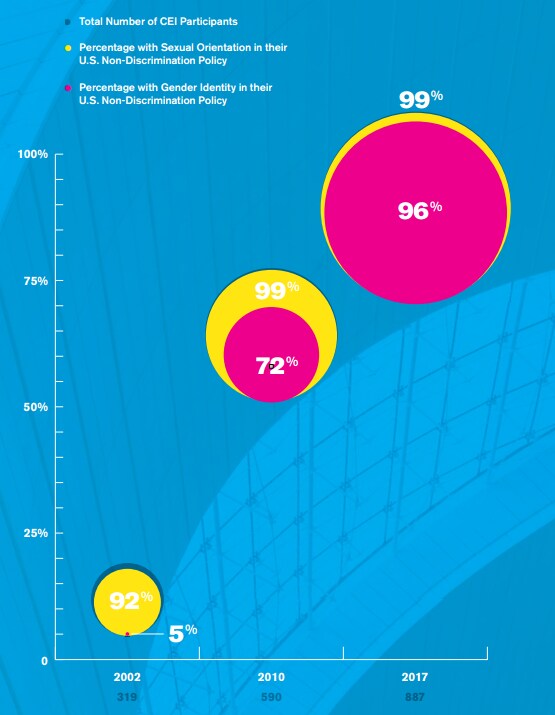The LGBTQ equality movement has come too far to be beaten now

More businesses than ever are adopting anti-discrimination policies
Image: ZUMA Press
Stay up to date:
Gender Inequality
Over the last year, the lesbian, gay, bisexual, transgender and queer (LGBTQ) community saw both the depths of hatred and discrimination aimed at us and some of the brightest, most historic moments of support we have ever received.
As the leader of the United States’ largest LGBTQ civil rights organization, the Human Rights Campaign (HRC), I have had the somber task of attending vigil after vigil for those killed simply because of who they are – whether they were dancing away a Saturday night in Orlando or advocating for their rights in Bangladesh.
The LGBTQ community is under attack across the globe, and that’s why it’s incumbent upon all of us to keep pushing forward and strengthen our global movement.

This past year, more and more of our allies made clear that LGBTQ equality is fundamental to securing a better, more prosperous future for everyone. Whether it was the first LGBTQ business summit held in Hyderabad, India, or the launch of a ground-breaking new programme in Mexico working to promote LGBTQ workplace inclusion, or even the first openly transgender speaker at a major political convention, HRC saw first-hand what true change and hope for greater equality looks like around the world.
As world leaders gather in Davos, the mandate is clear – our resolve must not waver when it comes to the full support of global LGBTQ equality. And we know that the business community in particular has led a global sea change in attitudes and the adoption of policies aimed at creating fairness in the workplace.
A majority (82%) of the Fortune 500 include explicit protections on the basis of sexual orientation and gender identity in their non-discrimination policies. Major businesses know that investing upfront in LGBTQ-inclusive policies, benefits and practices helps them attract and retain a diverse, talented workforce. It also helps them be creative and nimble in the marketplace, as consumers are looking for brands that reflect their values of fairness and inclusion. In the US alone, according to Witeck Communications, the estimated buying power of the LGBTQ community is $917 billion.
Beyond fundamental policies, businesses are growing bolder in their visibility and commitment to equality, as the number of members of HRC’s Global Business Coalition has tripled in one year. Launched in 2015, the coalition now includes 36 companies representing more than 3.5 million employees operating in over 200 countries around the world. The major businesses participating in the coalition cut across industries and generate more than $1 trillion in combined revenue each year.
Communities that promote inclusion thrive, and so do the businesses that invest in them. In today’s environment, this message – that equality is good for economic prosperity – continues to be forcefully delivered by global business leaders.
A good example is the case of North Carolina, when in March 2016 the state passed the deeply discriminatory, anti-LGBTQ House Bill 2. When those of us in the advocacy community met with then-governor Pat McCrory to rebuke the bill, we had the full strength of more than 100 major business leaders. That number soon grew to more than 200 leaders in the business community, speaking out and standing on the side of fairness. This level of leadership sends a powerful message to cities, states and workplaces around the world.
This progress has not happened overnight.
In 2002, HRC announced a new strategy – the Corporate Equality Index (CEI) – designed to push through political gridlock and transform the American workplace by offering a readily adoptable roadmap for creating LGBTQ inclusion across the private sector.
For historical context, in 2002 LGBTQ people were still prosecuted for having consensual relations until the 2003 Lawrence v. Texas Supreme Court decision that struck down these statutes. Beyond that, not a single federal law included clear protections for the LGBTQ community. It was in this environment that the business case for LGBTQ equality was created.
In 2002, only 13 businesses scored 100% on the index; today, 517 businesses have achieved this top rating, representing virtually every industry and investment throughout the world. In addition, the number of rated businesses affording specific protections for transgender employees has soared from 5% to 92%.

After years of a focused and successful dialogue with businesses on their US operations, last year we expanded the report’s scope and evaluation to include global non-discrimination policies. The results show that major businesses are not merely ensuring basic workplace fairness for LGBTQ employees in select locales, but are increasingly upholding LGBTQ-inclusive policies of non-discrimination wherever they do business. Ninety-five percent of global CEI businesses have fully inclusive, globally applicable non-discrimination policies and/or codes of conduct that include both sexual orientation and gender identity.
The momentum behind the global movement for equality is greater now than it has ever been, but with changing political leadership, we have many challenges ahead of us. We must always be mindful that full equality for the LGBTQ community is not a given – it’s a goal we all have to fight for each and every day.
Don't miss any update on this topic
Create a free account and access your personalized content collection with our latest publications and analyses.
License and Republishing
World Economic Forum articles may be republished in accordance with the Creative Commons Attribution-NonCommercial-NoDerivatives 4.0 International Public License, and in accordance with our Terms of Use.
The views expressed in this article are those of the author alone and not the World Economic Forum.
Forum Stories newsletter
Bringing you weekly curated insights and analysis on the global issues that matter.
More on Emerging TechnologiesSee all
Elena Fersman
May 14, 2025
Rya G. Kuewor
May 13, 2025
Tea Trumbic and Dhivya O’Connor
May 13, 2025
Anurag Sinha
May 9, 2025
Jake Okechukwu Effoduh
May 7, 2025





